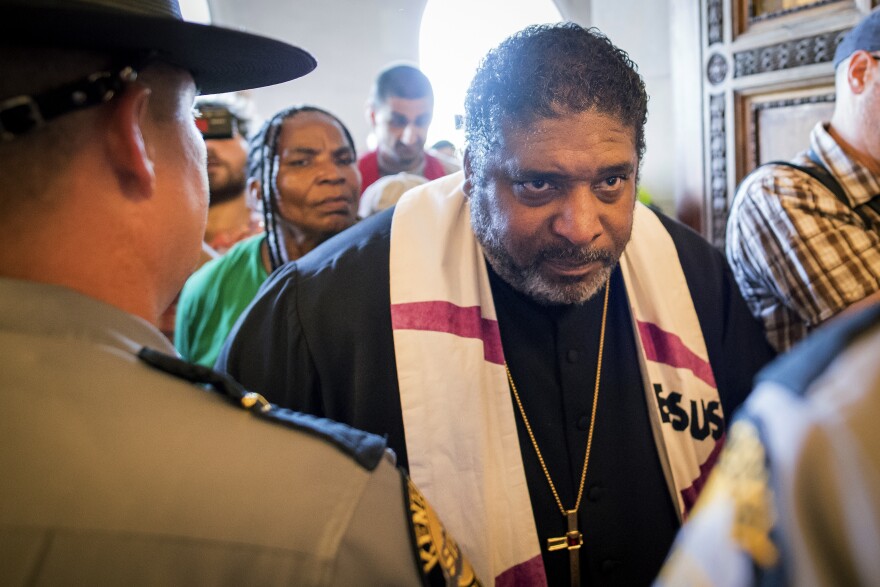Anti-poverty activists were denied group access into Kentucky's Capitol on Monday following an outdoor rally where the nation's first work requirements for Medicaid were denounced.
About 400 people demonstrated in front of the statehouse, and many then marched to the front doors of the Capitol in hopes of entering.
They were greeted by uniformed officers, and the group's leader was told only two demonstrators could enter at a time. When those two exited, another two would be allowed inside, rally members were told.
"So you're going to literally block us from our constitutional right?" asked the Rev. William Barber, co-chairman of the Poor People's Campaign, which helped organize the rally.
"Two at a time, sir," an officer replied.
A peaceful standoff ensued. The group chanted "let us in," prayed and sang a spiritual before moving from the front entrance. There were no arrests, and the activists vowed to return for another protest.
"That's not America," Barber said. "People who want health care, who are dying because they don't have it ... have a right to redress their government. This is a public building."
An officer told Barber the two-in standard was put in place recently.
Kentucky State Police officers limited statehouse access to the demonstrators because the group did not seek approval to protest inside the building, said Josh Lawson, public affairs commander for state police headquarters in Frankfort.
"They have been stopped from entering as a protest group," Lawson said in a phone interview.
He said some protesters spent the night in the Capitol a couple of weeks ago, which prompted the restriction to allow just two demonstrators into the building at a time.
"This has been in effect since the group stayed overnight," Lawson said. "Since that incident, that's what has created that policy so that we can maintain a better control over how many people we have in there so that at the end of the day we know we can close up and secure the facility."
Lawson said extra security would be needed if the protesters were allowed in and attempted to stay overnight again.
Barber said concerns about another possible sit-in didn't justify denying people access to the Capitol. He said the group wanted to assemble for more speeches.
More than a dozen uniformed officers were deployed just inside the Capitol at the front entrance as the demonstrators arrived. Barber said he wasn't angry at the officers for enforcing the standard, but he threatened to take the matter to court.
"We have a right to go in together," he said.
The Kentucky event was part of nationwide rallies as activists call for new programs to help the poor, an overhaul of voting rights laws and other social changes.
Speakers in Kentucky railed against tax cuts for corporations and weaker environmental regulations. Also targeted at the Kentucky rally were new work requirements for Medicaid.
The activists pointed to predictions from state officials that Medicaid will cover 95,000 fewer people in five years, once the work rules take effect. Medicaid is a joint federal and state health insurance program for poor and disabled people.
Kentucky was among states that expanded their Medicaid programs under President Barack Obama's health care law. By including able-bodied adults with no children, Kentucky's Medicaid rolls swelled by more than 400,000 people. But the state still faces significant health problems, and Gov. Matt Bevin and other Republican leaders say the program was too expensive to continue without changes.
In January, the Trump administration gave Kentucky permission to require adults between ages 19 and 64 to have at least 80 hours each month of "community engagement," to be eligible for Medicaid benefits. That includes working at a job, going to school, taking a job training course or community service. It was the first time the federal government had allowed a work requirement for Medicaid.
Barber denounced the work requirements at Monday's rally, saying: "The governor shouldn't be trying to take health care. He should be trying to find a way to get more health care for Kentucky."
Barber said taking health care away from people is immoral.
"These politicians who put their hand on the Bible and swear to uphold the Constitution, the problem is half of them don't know what's in either — the Bible or the Constitution," he said. "You can't find a Scripture anywhere that says deny people health care."


